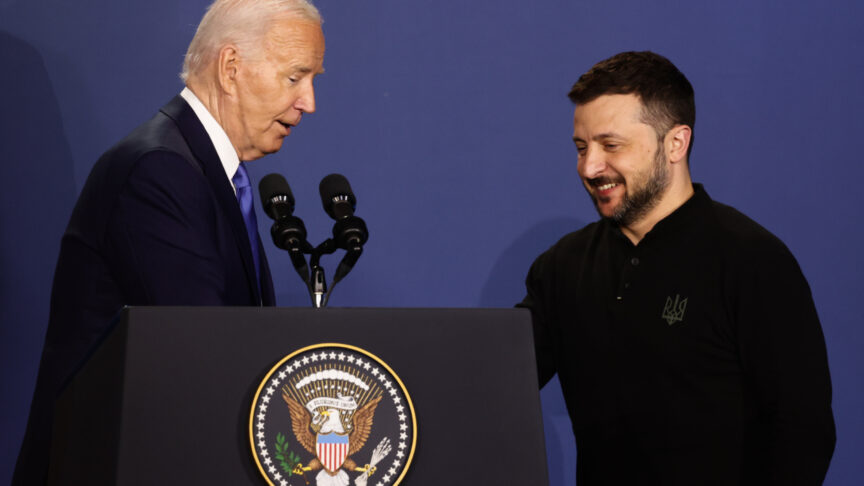The others
There are two kinds of European in the continent today; those who have Europe and those who want it
I have just come back from Albania where I found the people wonderful, but also rather unfortunate. If you ever want to check this for yourself, all you have to do is stand in the centre of Tirana. Looking to one side, the massive North Korean styled congress centre dominated by an enormous mural depicting the people in arms looms into view; looking to the other, typical Italian fascist neo-classical design meets the eye, legacy of the occupation by Mussolini’s troops. Turning round, you can see a small mosque, one of the few which survived the crazed regime of Enver Hoxha, who declared atheism the State religion, imposed a reign of terror on the country and destroyed a large part of its cultural heritage. This all makes for interesting pastiche, certainly, but it is problematic too from a historical perspective.
Despite five centuries of occupation, the Ottoman Empire failed to leave so much as a single University behind, and Hoxha’s dictatorship bequeathed the people half a million bunkers and a shattered civil society. The country’s international image is still weighed down by the film “Lamerica”, which portrayed the devastation brought about by the collapse of the banking system in 1997. At the time, people thought a Ponzi scheme of such proportions could only take place in a closed and backward society, but thanks to Bernard Madoff, the Albanians can rest easy, and even allow themselves a smile.
And one thing Albanians certainly do is smile. Mediterranean as they are, Albanians look back on the past with a sense of humour; the bunkers have given rise to a buoyant souvenir industry with a popular line in ashtrays, and in the pyramid shaped mausoleum which Hoxha built, a restaurant called “The Mummy” has been opened. The Mayor of Tirana, weary of the dilapidated state of the city’s buildings, encouraged people to paint their homes in eye catching colours, something which has become a tradition. Tirana has spruced itself up, and it is now a big, bustling city set against the backdrop of stunning, snow capped mountains.
During my trip I had the chance to talk to members of the government and opposition, exchange impressions with leading staff from research centres, and chat with journalists from the local media. All of them impressed me with their intelligence and the clarity of their vision of the future, especially Rexhep Meidani, President of the country from 1997 to 2002. The message I received from the people I spoke to was unanimous; it’s time to leave the past behind, to break with the image of the Balkans as a place of hatred, war, destruction, crime and corruption, and to turns our minds to the Balkans of the future.
And there precisely lies the key – in a European future. Albania will become a full member of NATO this April and the Stabilisation and Association agreement which governs relations with the EU is about to come into force, which will immediately allow the government to request official recognition as an accession candidate. Albania is afraid it might be left straggling by the pack in the race to join the EU; Macedonia already has official candidate status and it appears that Montenegro and Serbia will present their candidacies as well before too long (possibly during the Spanish presidency). There is a lot still to be done before accession is secured, but Albania is on the right road. The forthcoming parliamentary elections to be held in May will be a test of its maturity, though work is still to be done on some things as obvious as the electoral roll, and the political class remains too caught up in the fight for power, diverting energy from some highly important reforms which are still outstanding.
Naturally, Spain’s success arouses a good deal of admiration in Albania. Our country has an especially strong presence in Albanian cultural and political life thanks to a very active Embassy and a technical cooperation office with numerous projects underway, including the training of Albanian civil servants and the modernization of the civil service. This makes up for some of the misgivings felt in Tirana by the Spanish government’s decision to align itself with Serbia, something Albania has never quite managed to comprehend; at the end of the day, they argue, Albania has contributed a great deal more to regional stability. The tragedy of Kosovo, when Milosevic’s regime drove more than seven hundred thousand Kosovars to the Albanian border after years of torture and killings, is still very much fresh in the memory. At the time, it became fashionable to accuse Tirana of promoting a “Greater Albania” – to include the Albanians of Macedonia and Kosovo – but the allegation has proved to be a complete myth.
Back home, a strange feeling overcomes me that there are two kinds of European in the continent today; those who have Europe (and don’t want it), and those who want it (and don’t have it). [email protected]
This article was published in El País on 16 March 2009.
(English Translation)
Translated from Spanish by Douglas Wilson
Los otros
Regreso de Albania, donde he encontrado una gente maravillosa, pero con bastante mala suerte. No hay más que situarse en el centro de Tirana para comprobarlo. Miras a un lado y chocas de frente con un monumental palacio de congresos de estilo norcoreano presidido por un enorme mural donde se representa al pueblo en armas. Miras a otro y te tropiezas con el neoclásico típico del fascismo italiano, herencia de la ocupación por las tropas de Mussolini. Y si te vuelves, entonces ves una pequeña mezquita, una de las pocas que se salvó del régimen locoide de Enver Hoxha, que declaró el ateísmo religión de Estado, impuso un régimen de terror y destruyó una gran parte del patrimonio cultural del país. Un pastiche interesante, pero problemático desde el punto de vista histórico.
El Imperio Otomano, pese a los cinco siglos de ocupación, no dejó ni una sola universidad y la dictadura de Hoxha obsequió a su gente con medio millón de búnkeres y una sociedad civil completamente destruida. Sobre la imagen internacional del país pesa todavía como una losa la película Lamerica, que retrató la devastación producida por la quiebra del sistema bancario en 1997. Entonces se pensó que una estafa piramidal de tal magnitud sólo podía ocurrir en una sociedad cerrada e inculta, pero gracias a Madoff los albaneses pueden dormir tranquilos, y hasta permitirse sonreír.
Y desde luego que lo hacen. Los albaneses son gente mediterránea y enfrentan el pasado con humor: los búnkeres han dado lugar a una potente industria del souvenir en forma de ceniceros y en el mausoleo con forma de pirámide que Hoxha se construyó han abierto un restaurante llamado La Momia. El alcalde de Tirana, harto de la decrepitud de los edificios, promovió que se pintaran las casas de vistosos colores, lo que se ha convertido ya en una tradición. La ciudad se ha lavado la cara y ahora es una bulliciosa urbe con unas impresionantes montañas nevadas de trasfondo.
He tenido la oportunidad de hablar con miembros del Gobierno y de la oposición, intercambiar impresiones con algunos responsables de institutos de investigación y charlar con periodistas de algunos medios locales. Todos me han impresionado por su inteligencia y la claridad de su visión de futuro, especialmente Rexhep Meidani, que presidió el país entre 1997 y 2002. El mensaje de todos ellos es unánime: es hora de dejar atrás el pasado, romper con la imagen de los Balcanes como lugar de odio, guerras, destrucción, criminalidad y corrupción y comenzar a pensar en los Balcanes del futuro.
Ahí está precisamente la clave: en un futuro europeo. Albania entrará en la OTAN el próximo mes de abril y el acuerdo de estabilización y asociación, que rige las relaciones con la UE, está a punto de entrar en vigor, lo que permitirá inmediatamente al Gobierno solicitar ser reconocido oficialmente como candidato a la adhesión. Albania teme quedarse descolgada en la carrera hacia la UE, pues Macedonia ya tiene reconocido el estatuto de candidato y parece que Montenegro y Serbia presentarán también próximamente sus candidaturas (posiblemente durante la presidencia española). Queda mucho por hacer para lograr la adhesión, pero el país está en el camino correcto. Las próximas elecciones parlamentarias, que se celebrarán en mayo, serán una prueba de madurez, aunque cosas tan obvias como el censo electoral están todavía por completar y la clase política sigue en ocasiones demasiado enzarzada en peleas por el poder que distraen energías de las importantísimas reformas todavía pendientes.
Lógicamente, lo logrado por España despierta mucha admiración en Albania. Nuestro país tiene una presencia destacada en la vida política y cultural albanesa, gracias a una embajada muy activa y a una oficina técnica de cooperación con numerosos proyectos a su cargo, entre ellos, la formación de funcionarios albaneses y la modernización de la Administración pública. Ello compensa las reticencias por un alineamiento del Gobierno español con Serbia que no terminan de comprender: al fin y al cabo, argumentan, Albania ha contribuido muchísimo más a la estabilidad regional. En su memoria está todavía presente la tragedia de Kosovo, cuando el régimen de Milosevic, tras años de asesinatos y torturas, empujó a sus fronteras a más de 700.000 kosovares. Entonces se puso de moda acusar a Tirana de promover una Gran Albania que incluyera a los albaneses de Macedonia y Kosovo, pero la realidad ha demostrado que todo aquello era un gran mito.
A mi vuelta me invade la rara sensación de que en Europa hay hoy en día dos tipos de europeos: los que la tienen (y no la quieren), y los que la quieren (y no la tienen).
Publicado en El País el 16 de marzo de 2009
The European Council on Foreign Relations does not take collective positions. ECFR publications only represent the views of their individual authors.


